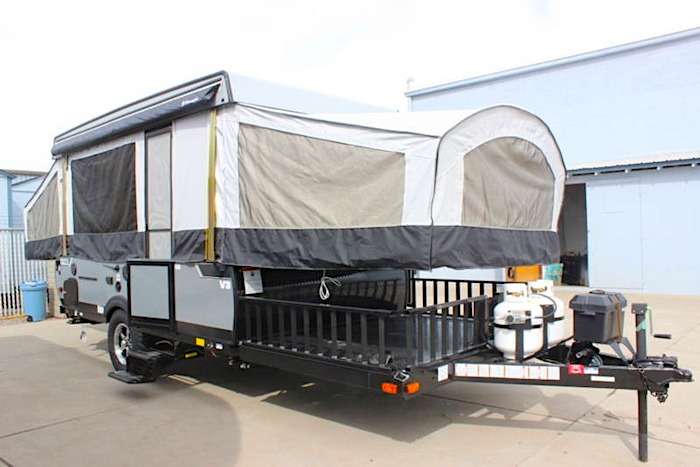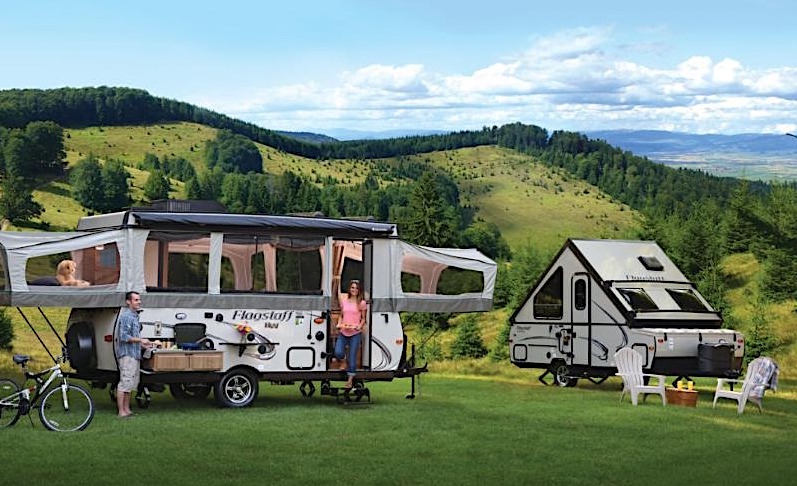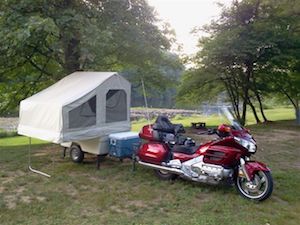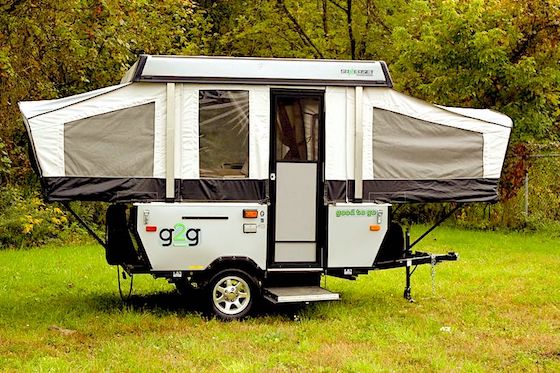Thanks for your support! If you make a purchase using our links in this article, we may make a commission. And, as an Amazon Associate, I earn from qualifying purchases. See the full disclosure here.
As you consider buying a pop-up camper, you may be wondering, how much does my pop-up camper weigh? so you can figure out if your vehicle can tow it or not. This varies depending on what type of pop-up camper you will purchase.
Pop-up campers come in a variety of sizes with different amenities. So, what is an average pop up camper weight? Smaller pop-up campers can weigh as little as 600 pounds and up to 4,500 pounds for large pop-up campers, but the average weight of a pop-up camper is 2,000 pounds. It’s good to know how much your pop-up camper weighs before you hit the road.
For those who camp a lot and enjoy life on the road, but don’t have the means to towing a travel trailer or purchasing an RV, pop up campers are great. These convenient campers are much smaller and lighter than traditional travel trailers. Being small and collapsible makes them easy to tow with minimal wear and tear to your vehicle.
Pop Up Camper Weight Ratings and Definitions
When purchasing a pop-up camper, it’s good to know how much everything is going to weigh. There are a lot of terms and weights out there. In order to safely tow your pop-up camper, you should know what each weight listing means.
UVW (Unloaded Vehicle Weight) – This is the weight of the pop-up camper when it reaches the manufacturer with a full fuel tank. Essentially this is the lightest your pop-up camper is ever going to be before you pack it with your gear.
CCC (Cargo Carrying Capacity) – This is the amount of gear, water, and other necessities you can pack. If you’re starting with an empty camper at the UVW, weigh everything before it goes into the camper. Even if you don’t have an empty camper, weighing everything will keep you within your carrying capacity. You’d be surprised how quickly everything can add up. Start with the necessities, and add from there.
GAWR (Gross Axle Weight Rating) – This is the maximum weight that the trailer’s axels can safely support. This rating includes gear, water, and the weight of the camper body on the frame. Surpassing this rating could cause the trailer to fail under the load.
GVWR (Gross Vehicle Weight Ratio) – This is how much your vehicle can carry, including the weight of the hitch plus vehicle carrying capacity. For your vehicle carrying capacity, think passengers, pets, and gear stored in your vehicle. The GVWR is not just about what your vehicle tows, but also what goes inside the vehicle as well. You need to make sure you save weight for yourself in the vehicle.
How Much Can Your Vehicle Tow?

When selecting a pop-up camper, keep in mind how much your current vehicle will be able to tow. Unless you plan to upgrade your vehicle, stay below your vehicle’s towing capacity.
To figure out how much your vehicle can tow, you can check the owner’s manual or look up your vehicle’s VIN number. You can also look up your vehicle’s make and model to see what you’re capable of towing. Keep in mind that towing capacity can vary depending on if you have the basic model or all the bells and whistles.
Once you figure out how much your vehicle can tow, it’s best to stay several hundred pounds below this limit. This gives you some wiggle room for picking up extra gear or water. Plus, staying below the limit and not pushing your weight puts less wear on your vehicle.
Remember, when determining what your vehicle can tow, this weight includes both the packed trailer weight and what you put in the vehicle. Don’t load up your trailer with so much gear that you have to leave your dog behind.
Keep in mind that water is heavy, but also necessary. Water weighs eight pounds per gallon. This is an important weight that you need to factor in when deciding what comes and what stays behind.
Are Brakes Required on a Pop-Up Camper?
Trailer brakes are required on trailers over 3,000 pounds. However, if you’re under this limit, it’s a good idea to consider trailer brakes once you get above 2,500 pounds towing. Overall, trailer brakes make driving with a heavy trailer safer.
Trailer brakes make towing much safer. You don’t have to worry about your trailer rear-ending your vehicle on steep descents. Likewise, you’ll have better control braking and stopping when you get into town or driving in traffic.
If your vehicle is capable of towing over 3,000 pounds, you should already have a trailer brake controller installed. If you don’t, a trailer brake controller can be easily installed by a mechanic.
Advantages of Pop Up Campers

There are lots of benefits to pop-up campers. They’re smaller and more affordable than RVs. In many cases, you get better gas mileage towing a pop-up camper than driving an RV.
Pop-up campers don’t break the bank compared to an RV. If you already have a vehicle capable of towing, you’re halfway there. Since pop-up campers don’t have an engine, you drastically decrease to price tag right off the bat.
Since pop-up campers are on a trailer, they can be left behind at campsites. This gives you the freedom to take off in your vehicle after setting up camp. Being able to leave your trailer behind allows you to save your campsite, and makes exploring the area easier. Most National Parks have steep, winding roads, so being able to ditch the trailer and weight is ideal.
Once everything is taken down, pop-up campers become small and compact. By collapsing down to a small size, you’re able to get better gas mileage on the road than in a traditional travel trailer. The low profile of a pop-up camper makes it more aerodynamic than a travel trailer.
Collapsing down to a compact size is not only great for gas mileage but also for storing your pop-up camper. It’s much easier to store a collapsed pop-up camper than a traditional travel trailer.
RELATED READING: Check out our article What You Should Know Before Buying a Pop Up Camper to be sure you make the best decision.
Popular Pop Up Campers By Weight Class
There are three sizes when it comes to pop-up campers; small/mini, medium, and large. What size you go with depends on how much your vehicle can tow, cost, and how many people you want it to sleep. As the size of the pop-up camper goes up, so does the tow weight, cost, and number of people it sleeps.
Small, or mini pop-ups are generally under 1,000 pounds and can be towed by most vehicles that have a trailer hitch. These pop-ups fit 1 or two people and even have room for storage. Some pop-ups have become so small and lightweight that they can be towed by a motorcycle.
Medium pop-up campers generally weigh between 1,000 to 2,000 pounds. These campers are small and compact, but can still have two sleeping quarters and kitchen/living area. These are perfect for small families or couples looking for more space.
Large pop-up campers are the heaviest but have the most room for sleeping and living. This size is great for families and those looking for more space and storage. Of course, since large campers are the heaviest, you need a large vehicle to tow them. Large pop-ups generally weigh over 2,000 pounds. Once you get into this range, you want to consider trailer breaks for your pop-up.
In each weight class, the trailer weight is affected by what amenities you put in it. If you choose bulky and heavy amenities, then your camper weight will go up. Keep in mind if you’re camping, do you really need all the bells and whistles?
PRO TIP: We highly recommend that you rent before you buy. That’s what we did before we bought our RV and we learned everything we liked and didn’t like and with this info we made a great buying decision. Check out our article Renting a Pop Up Camper – A Complete Guide to learn all the details about renting a popup camper.
Pop-Up Campers for Motorcycles

Motorcycles are a wonderfully freeing mode of transportation. Believe it or not, you can haul a pop-up camper behind your bike. You just have to keep the weight to a minimum.
In reality, a camper that’s small enough to be hauled behind a motorcycle is not far off from camping. You’ll still reap the benefits of the great outdoors, just with extra comfort in the sleeping department.
Another huge benefit? You get to avoid having to pack and repack your bags every time you move campsites. On a motorcycle, this can be a major lifesaver.
For the adventure of a lifetime, try a 250- or 375-pound pop-up camping experience paired with a motorcycle journey. Roadman Campers carries some really nice pop-ups and accessories for motorcycles.
RELATED READING: Check out our article called 6 Best Pop Up Campers for Motorcycles to see some really cool road trip ready popup campers!
Pop-Up Campers for Cars and Compact SUVs
Vacationing with your loved one in the daily ride can be pretty convenient. Have your vehicle pull a well-fitting camper, and the adventure becomes even more exciting.
In campers like this, you can add a TV for a romantic movie night in. So too can you include a small kitchen. In these, you can cook up warm breakfasts to go with your morning joe. By the time the weekend comes, the extra space may prove to be rewarding.
The sleeping area in these kinds of campers is typically set for two to four. Some of these small to medium sized pop-ups even come with bathrooms. During the day, you can flip up the bed for a screened in sitting area to get away from the bugs.
A newer type of pop-up that is very popular is the A-Frame pop-up camper.
RELATED READING: For more info about this type of pop-up check out our article How Much Does an A-Frame Pop Up Camper Cost? where we discuss the cost but and also the features of an A-Frame pop-up.
For a seamless family holiday, attach a 600-pound pop-up camper to the back of your family crossover. Then load everyone in the vehicle and hit the open road.
Pop-Up Campers for Trucks
This is where the pop-up genre shines. Heavy-hauling trucks are capable of carrying the coolest pop-up campers on the market. Should you have a truck that can handle the job, it might just be the way to go.
With a sizable camper, you’ll still be able to get away on rainy weekends and enjoy it all the while. They’re big enough to stretch your legs and then some while holding all your favorite amenities.
Choose a large camper with or without a bathroom, kitchen, and movie zone. (Or include as many amenities as you like; just make sure your truck can handle the weight!)
For a comfortable getaway, pop-up campers in the 900 to 2,000-pound range offer an inexpensive amenity filled, easy to tow camping option. They’re like a home away from home, and that’s what really matters.
What Determines the Weight of a Pop-Up Camper?
Most pop-up campers have similar foundations. It’s not the walls and the trailer that make a camper heavier. It’s the accessories and amenities within those walls that increase the weight.
The most basic of pop-up campers are bound to be the lightest. For many people, this is enough, as they’re just seeking a way to get off the ground. However, some people crave a bit of luxury, even in small ways. If you don’t mind the added weight, a well-equipped pop-up camper can become an inexpensive glamper.
So what kind of extras are we talking about here? Having a kitchen in your pop-up camper means added weight. You’ll be investing in a built-in sink, stove, cupboards, and a refrigerator to boot.
A glass shower door and extra wiring for your entertainment needs are no exception, either. An indoor bathroom means taking on the weight of plumbing and water (the latter of which is awfully heavy).
Basically, if you need to limit your pop-up camper weight, make a list of what really matters. Would you rather have a kitchen or a bathroom? An entertainment center or a large bed? If you want it all, perhaps it’s time to invest in a heavy-hauling machine.
Pop Up Camper Towing Tips
Before you hit the road, make sure everything is in order. You don’t want to get to your destination and realize something is not right. Before you leave home, you’ll want to check over your trailer to make sure everything is in working order. It’s much less frustrating to find out something is broken before you leave home so you have time to fix it.
Check your brakes before you take off. Hook up your trailer and take a test drive around your neighborhood before you load everything up. Make sure your car has enough braking power to stop safely while towing the trailer. If you have trailer brakes, make sure those are in working order as well.
Check your trailer lights. Make sure all lights are working, including tail lights, blinkers, and brake lights. Even better, make sure all your vehicle lights are working as well. It’s better to know your lights are not working before you leave, then driving at night with no lights.
Make sure your tires are correctly pressurized before leaving. A short trip to the gas station during your brake test drive is a great idea. Many gas stations have free tire pumps available.
Under no circumstances do you want your trailer to be overweight. Overweight trailers are not safe, nor are they good for your vehicle. To best avoid this, weigh all your gear before it goes into the trailer or vehicle. This may seem like a tedious task, but it’s better than being overweight. Equipment, water, and passengers add up quickly.
Can I Rent a Pop Up Camper?
You can rent pop up campers and if you are considering buying one we highly recommend you rent one first. Susan and I recommend this to people all the time because we rented a Class C RV BEFORE we bought ours and it helped us to become educated buyers.
Since we rented first we know exactly what we liked and didn’t like about the design and features of Class C RVs and we made a great buying decision. You can too!
We also recommend outdoorsy for your tent trailer rentals. They have a huge selection and we love their customer service. To learn more about how to rent a pop up tent trailer check out our article called Everything You Need to Know About Popup Camper Rentals ~ PLUS Discount Code! or just hit the button below to browse pop up camper rentals near you.
Conclusion
No matter what pop-up camper you choose, you’re going to have a great time camping with it. The ease of being able to pop up your living quarters and get out of the rain is great. As far as how much your pop-up camper weighs, the more living space you have and amenities you bring all affect your weight. Happy camping!
Do you have any info to share about pop-up campers? Please leave your comment below.



Hi,
Thanks for the article it’s very helpful. My vehicle (a two door Jeep Wrangler) has a towing limit of just 2000 pounds. I did have the towing package installed. When I look at the weight of the pop ups should I look at the UVW and understand that all of my gear will need to be stowed in my Jeep?
Again, thanks Matt